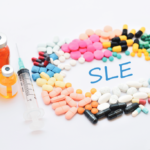This session provided both advice on providing clinical care and tips on the subtleties of terminology when interacting with trans & nonbinary or gender diverse patients.

To Treat or Not to Treat? The Great Debate on Treatment of Subclinical Rheumatoid Arthritis
PHILADELPHIA—One of the great advancements in the field of rheumatology in recent years has been the increased understanding of various stages of disease in rheumatoid arthritis (RA), including what is termed subclinical rheumatoid arthritis. However, questions remain regarding whether to treat patients with subclinical disease and whether treatment of these patients has implications in preventing…

The Complexity of SLE Drug Research
PHILADELPHIA—On Saturday, Nov. 12, at ACR Convergence 2022, Joan T. Merrill, MD, director of clinical projects in the Arthritis & Clinical Immunology Program at the Oklahoma Medical Research Foundation in Oklahoma City, gave a presentation on the future of drug development and treatments for systemic lupus erythematosus (SLE). She described how an in-depth understanding of…

What You Need to Know About COVID-19 & Therapies for Rheumatic Diseases
PHILADELPHIA—Since March 2020, the world has been turned upside down by the COVID-19 pandemic. Rheumatologists must understand how to best protect and treat their patients with autoimmune conditions at risk for infection due to immunosuppressive therapy. At ACR Convergence 2022, the session titled, Latest COVID and Rheumatic Disease Therapies: What You Need to Know, provided…

COVID-19: Strategies to Protect Adult & Pediatric Patients
An ACR Convergence 2022 session provided practical updates on ways to best protect pediatric & adult patients with rheumatic disease from COVID-19.

Patients Living with Chronic Illness
At ACR Convergence 2022, three women with rheumatic diseases discuss the profound life changes that the diseases wrought and ways they’ve found to cope.

Clinical Rheumatology Year in Review—2022
In this overview of clinical updates in rheumatology in the last year, high-impact studies were discussed, including the GLORIA, ORAL Surveillance and MIRROR trials.

A Shot of Wisdom: Vaccinations in Patients with Rheumatic Disease
PHILADELPHIA—The treatment of rheumatic diseases is often a double-edged sword: immunosuppressive regimens can be very effective in reducing disease activity, but the cost of such treatments may be seen in the form of increased risk of infection. At ACR Convergence 2022, the session titled ACR Guidelines for Vaccination in Patients with Rheumatic and Musculoskeletal Diseases…

Patients Fight Against Dark Days & Find Ways to Cope
PHILADELPHIA—Amy Gietzen started feeling the pain when she was 19. Her forearms, elbows, wrists and fingers were constantly swollen and sensitive. Six months later, she saw a doctor and was diagnosed with systemic diffuse scleroderma—a particularly hard-to-manage rheumatic disease with wide-ranging effects. Ms. Gietzen, who spoke at ACR Convergence 2022 and is a public speaker,…

Rheumatic Disease Research in Indigenous Populations
This ACR Convergence 2022 session focused on ways to improve health equity in Indigenous populations.
- « Previous Page
- 1
- …
- 16
- 17
- 18
- 19
- 20
- …
- 36
- Next Page »